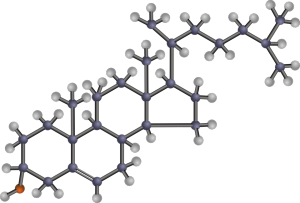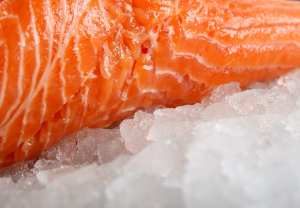
WHAT IS
cholesterol?
Cholesterol is a certain type of fat which can be found in the blood. You need a certain amount of cholesterol for the good functioning of your body cells and in order to produce important hormones. However, if there is too much cholesterol in the blood, it is deposited on the inside wall of the arteries, determining the formation of atheroma plaques. Because of that ”construction”, arteries are narrowed – the process being called artery stiffening or atherosclerosis. If an artery supplying blood to the heart is completely blocked, the heart muscle necroses (dies) – an infarct or heart attack. If an artery in the brain is completely blocked, a stroke occurs.
Why is blood cholesterol important?
High blood cholesterol is one of the major cardiovascular risk factors and, at the same time, increases the chances of getting heart diseases. One of the best methods to prevent cardiovascular diseases is to maintain the cholesterol within the normal limits.
Where does cholesterol come from?
Cholesterol is produced in the body, mainly by the liver – endogen cholesterol (the body is able to produce all the cholesterol it needs). The increase of blood cholesterol can be caused by inherited health issues or by a diet based on fat, either of animal origin, or coming from fast-food products.
Some foods, such as eggs, liver and crustaceans contain cholesterol, but it does not significantly affect the amount of fat in the blood. You can moderately consume foods containing cholesterol, as part of a healthy, varied diet.
What you did not know about cholesterol?
There are two main types of cholesterol:
- HDL cholesterol (high-density lipoproteins) – known as ”good cholesterol” or healthy cholesterol, as it ”scrapes off” cholesterol from the arterial wall. Periodic physical activities and physical exercise can help increase HDL level.
High levels of HDL cholesterol can protect you from heart diseases. - LDL cholesterol (low-density lipoproteins) – known as ”bad cholesterol”, given that it gets stuck to your artery walls, narrowing them. That reduces the amount of the blood reaching the heart or the brain.
High levels of LDL cholesterol will increase the risk of heart diseases.
About Fat
 Fat in food products is a mixture of saturated and non-saturated fat.
Fat in food products is a mixture of saturated and non-saturated fat.
Monounsaturated and polyunsaturated fat is fat which can help decrease the amount of LDL cholesterol in the blood and reduce the risk of heart diseases.
Polyunsaturated and monounsaturated fat can be found in vegetal oils – sunflower, olive and rapeseed oil. They can also be found in several types of nuts or in fish oil (sardines, mackerel, trout and salmon).
Saturated fat can increase the LDL cholesterol, which implicitly leads to an increase in the risk of heart diseases.
Saturated fat can be found in food products such as: butter, margarine, lard, sour cream, cheese, fat meat, cakes, cookies and chocolate. Read the labels of foods (processed or already cooked) in order to find out the amount of saturated fat. Plus, check for any mention of the word hydrogenated. If this term is present in the ingredient list of your product, this means it contains trans-fats favoring the increase of LDL cholesterol.
Is your cholesterol too high?
If you are over 40 or if a member of your family has high cholesterol, if they were diagnosed with heart diseases or had a stroke, it is very important to ask your doctor if you have to take some cholesterol-measuring tests.
If you need to lower your cholesterol, your physician will advise you on the changes that you need to make to your lifestyle and they may give you certain medicines. If you receive any treatment, it is important to carefully follow instructions.
| Cholesterol | Healthy levels in mmol / l or mg/dl |
| The total cholesterol | not higher than 5mmol/l or 190 mg/dl |
| LDL cholesterol | not higher than 3mmol/l or 115 mg/dl |
| HDL cholesterol | higher than 1mmol/l or 40 mg/dl |
Remember, the cholesterol level (especially LDL cholesterol) must be lower if you already have a certain degree of arterial trouble.
Methods to lower the cholesterol level:
- Lose weight until you reach a healthy weight.
- Eat more fruit and vegetables.
- Eat more whole meal cereal and brown bread.
- Choose lean meat.
- Choose low-fat dairy products.
- Only occasionally eat sweets, fast-food products or unhealthy snacks such as chips etc.
- Avoid deep-fried foods, and while cooking your food, choose steam or oven or grill cooking.
Low HDL cholesterol?
If a lab test proves that you have your HDL cholesterol under the recommended level, you will have to do so as to make HDL cholesterol values increase, in order to reduce the risk of heart diseases.
The HDL level can increase healthily by:
- physical exercise;
- reducing your weight;
- giving up smoking.
Your physician can prescribe you a treatment to increase the HDL level.
What are triglycerides and how can they affect the heart?
Triglycerides are another type of fat that can be found in the blood. A too high level of triglycerides can increase the risk of cardiovascular diseases.
What can you do if your level of triglycerides is too high?
Follow the general advice for lowering blood cholesterol. This will also contribute to lowering triglycerides.
Try to eat fat fish (sardines, mackerel, salmon, trout) at least twice a week. Fish oil, which contains n-3 or Omega 3 fatty acids, improves blood circulation, reduces its viscosity and prevents the formation of blood clots. If you are used to drink alcohol, the recommendation is to not exceed a glass a day (for instance, a small glass of wine or a small beer), however, not every day.




